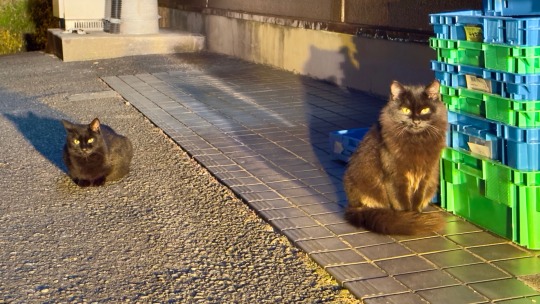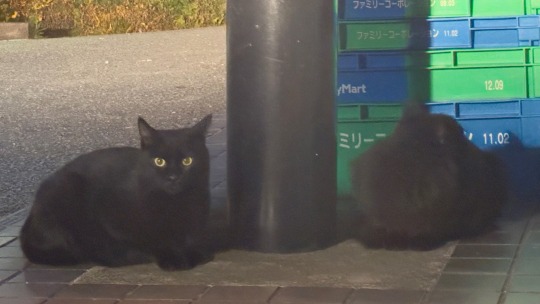#出水
Explore tagged Tumblr posts
Text


2024年12月28日 9:30
城南から南へ
曇りのち雨のち晴れ
@国道328号線
10 notes
·
View notes
Text
◁ Macca まっか x 水川スミレ MIZUKAWA Sumire ▷ 2023年8月21日
#macca#まっか#sumire mizukawa#水川スミレ#mizukawa sumire#miri mizuki#水稀みり#mizuki miri#Dカップ#AV女優#ノーブラ#野外露出#ニプレス#these two silly crackheads#video
32 notes
·
View notes
Text





出口亜梨沙チャン₍ᐢ⑅•ᴗ•⑅ᐢ₎♡
Arisa Deguchi Japanese gravure idol
#gravure idol#japan beauty#japan girl#bikini beauty#lingerie#グラビア#グラビアアイドル#グラビア画像#ビキニ女子#ビキニ水着#下着美女#下着グラビア#出口亜梨沙#arisa deguchi
295 notes
·
View notes
Text

SSr
348 notes
·
View notes
Text


韓国出張(4泊5日)…無事に仕事も終わったし、さて日本に帰ろっと!(。•̀ᴗ-)✧
朝、昼、夜と毎日食べ過ぎ?体重が3kgは増えたかと…
「무엇을 먹고 싶습니까? (何が食べたいですか?)」と行く場所行く場所で聞かれ、遠慮せず答える自分が悪いのかとも思います。何を食べても美味しいし!(^~^;)
チャミスル(韓国焼酎)のワンショット飲みで、毎晩KO状態でした⤵⤵⤵
来週の京都→大阪の出張も頑張ろっと!
20241213
37 notes
·
View notes
Text

Sean bienvenidos a una nueva publicación en la cual aclararemos las diferencias entre un templo y un santuario japonés dicho esto pónganse cómodos que empezamos. - Seguramente, todos hemos visto alguna vez en fotos templos y santuarios que están por todo el archipiélago nipón y más de una vez nos hemos preguntado: ¿Cuáles son las diferencias entre ellos? - Primero la palabra santuario ¿Qué significa?: Es el lugar en el que los japoneses adoran a todos los kamis por lo cual cada uno tiene el suyo propio, también cabe destacar que puede ser una montaña un lago ect.. Cuando buscamos esta palabra en español, hace referencia a un templo,entonces ¿Cuáles son las principales diferencias? la principal sería que los santuarios sintoístas, disponen de una puerta principal llamada torii a diferencia de los templos budistas, que disponen de una pagoda. Ejemplos de templos budistas por ciudades Templo de Kiyomizu-dera (Kioto) Templo Kinkakuji (Kioto) Templo Senso-ji (Tokio) Templo de Hokokuji (Kamakura) Templo Todai-ji (Nara) Templo de Sanjusangendo (Kioto - Santuarios japoneses por ciudades: Santuario de Ise – Ciudad de Ise Santuario Meiji – Tokio Santuario Itsukushima – Miyajima Santuario Sumiyoshi Taisha – Osaka Santuario Hie Jinja – Tokio Santuario Izumo – Ciudad de Izumo - Para aclarar las dudas, entre un santuario y un templo: También hay que tener en cuenta los distintos nombres y otras de las cosas que caracterizan un templo son las siguientes : Komainu, Temizuya o chōzuya, Salas principales, Amuletos,Komainu, Temizuya el honden y el haiden. En próximos capítulos podemos hablar de cada uno de ellos, aparte de seguir realizando publicaciones de historia, arqueología, geografía entre otros temas de japón os deseo un cordial saludo. - Welcome to a new publication in which we will clarify the differences between a temple and a Japanese sanctuary. That being said, make yourself comfortable and let's get started. - Surely, we have all seen temples and sanctuaries that are all over the Japanese archipelago in photos and more than once we have asked ourselves: What are the differences between them? - First, the word sanctuary What does it mean?: It is the place where the Japanese worship all the kamis, so each one has their own, it is also worth noting that it can be a mountain, a lake, etc. When we look for this word in Spanish, it refers to a temple, so what are the main differences? The main one would be that Shinto shrines have a main door called torii. unlike Buddhist temples, which have a pagoda. Examples of Buddhist temples by city Kiyomizu-dera Temple (Kyoto) Kinkakuji Temple (Kyoto) Senso-ji Temple (Tokyo) Hokokuji Temple (Kamakura) Todai-ji Temple (Nara) Sanjusangendo Temple (Kyoto) Shitennoji Temple (Osaka) - Japanese shrines by cities: Ise Shrine – Ise City Meiji Shrine – Miyajima Sumiyoshi Taisha Shrine – Osaka Fushimi Inari Shrine – Kyoto Hie Jinja Shrine – Tokyo Izumo Shrine – Izumo City - To clarify doubts, between a sanctuary and a temple: We must also take into account the different names and other things that characterize a temple are the following: Komainu, Temizuya or chōzuya, Main rooms, Amulets, Komainu, Temizuya the honden and the haiden. In future chapters we can talk about each of them, apart from continuing to publish publications on history, archaeology, geography, among other topics about Japan, I wish you a cordial greeting. - 寺院と日本の聖域の違いを明確にする新しい出版物へようこそ。そうは言っても、安心して始めましょう。 - 確かに、私たちは皆、日本列島各地にある寺院や聖域を写真で見たことがあり、それらの違いは何だろうかと自問したことが一度や二度ではありません。 - まず、聖域という言葉はどういう意味ですか?: それは日本人がすべての神を崇拝する場所であり、それぞれに独自の神があり、それが山や湖などであることも注目に値します。この単語はスペイン語で寺院を指しますが、主な違いは何でしょうか? 主なものは、神社には鳥居と呼ばれる表扉があることです。 塔のある仏教寺院とは異なります。 都市別の仏教寺院の例 清水寺(京都) 金閣寺(京都) 浅草寺(東京) 報国寺(鎌倉) 東大寺(奈良) 三十三間堂(京都) 四天王寺(大阪) - 都市別の日本の神社: 伊勢神宮 – 伊勢市 明治神宮 – 東京 厳島神社 – 宮島 住吉大社 – 大阪 伏見稲荷大社 – 京都 日枝神社 – 東京 出雲大社 – 出雲市 - 聖域と寺院の間の疑問を解消するには、次のような名前や寺院を特徴付けるその他のものについても考慮する必要があります: 狛犬、手水舎または手水舎、主室、お守り、狛犬、本殿と拝殿。 今後の章では、歴史、考古学、地理、その他日本に関するトピックに関する出版物の発行を続けることに加えて、それぞれのテーマについてお話します。心からご挨拶を申し上げます。
#清水寺#京都#金閣寺#伊勢神宮#伊勢市#日枝神社#東京#出雲神社#出雲市#寺院#神社#日本#歴史#ユネスコ#Kiyomizuderatemple#Kyoto#KinkakujiTemple#IseShrine#IseCity#HiJinjaShrine#Tokyo#IzumoShrine#IzumoCity#temple#Shrine#japan#history#unesco
28 notes
·
View notes
Text


谢谢哥哥的支持😊
23 notes
·
View notes
Text
喜歡就是喜歡,愛就去愛。不要用一種交易的行為,玩一種概率的遊戲。在一段相處的關係裡,願賭服輸,敢於愛,享受付出,當愛逝去時,勇於退出。
If you like it, just do like it, if you love it, go to love it. Don't use trading behavior to play a game of probability. In a relationship, be willing to admit defeat, dare to love, enjoy giving, and have the courage to quit when love dies.
It's my answered also my philosophy of life. 🙏 🪷 (sorry to reply it late.)
06. 15. 2024 Chu Lan~*

#answered#don't use trading behavior to play a game of probability#別用交易的行為玩概率的遊戲#my philosophy of life#敢愛敢恨且勇於退出#絕不拖泥帶水
22 notes
·
View notes
Text






先客がいた
@ファミリーマート 出水向江町店
30 notes
·
View notes
Text

何の変哲もない水田風景
なのに、どんな絶景よりも心惹かれるのは何故だろう
デジタル写真 2024撮影 撮って出し
20 notes
·
View notes
Text

Eizouken ni wa Te wo Dasu na!
ENG Title: Keep Your Hands Off Eizouken!
JP: Title: 映像研には手を出すな!
Adventure・Comedy・Slice of Life TV・12 Episodes Year: Winter 2020 Studio: Science SARU Character: Sayaka Kanamori ( 金森さやか ) Tsubame Mizusaki ( 水崎ツバメ ) Midori Asakusa ( 浅草みどり)
#Eizouken ni wa Te wo Dasu na!#Keep Your Hands Off Eizouken!#映像研には手を出すな!#Science SARU#Sayaka Kanamori#金森さやか#Tsubame Mizusaki#水崎ツバメ#Midori Asakusa#浅草みどり#anime#manga#anime gif#Winter 2020#2020#2020s anime#20s anime
19 notes
·
View notes
Photo

(Xユーザーの南みゆかさん: 「✩ おしらせ ✩ 2月27日発売ヤングチャンピオンのら表紙巻頭グラビアに掲載して頂きます!! 初のヤングチャンピオンさんでの表紙🥺 嬉しすぎるねー!><💘 絶対絶対げっとしてください🎶🤞🏻🤞🏻 #おーつー #南みゆか #ヤングチャンピオン #グラビア #水着 https://t.co/tgGoZptmTk」 / Xから)
32 notes
·
View notes
Text

《鬼太郎誕生 咯咯咯之謎》 THE BIRTH OF KITARO
30 notes
·
View notes
Text

Lemony acid rinse
10 notes
·
View notes




